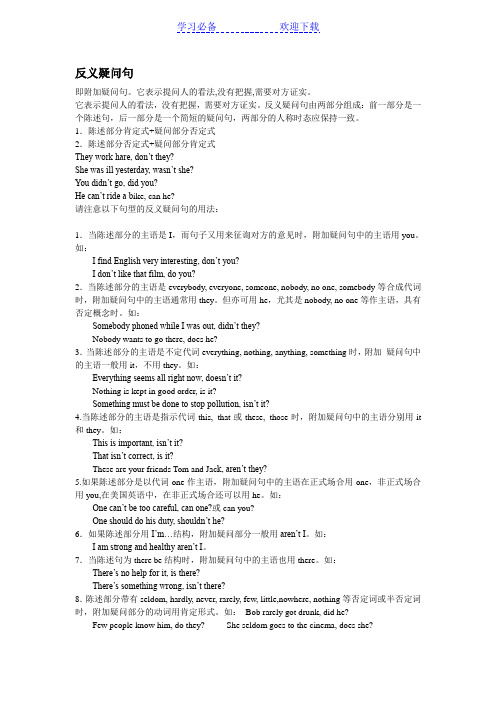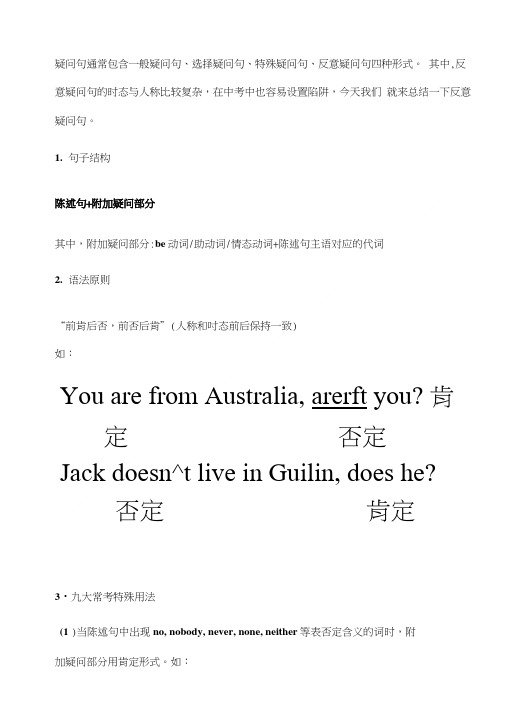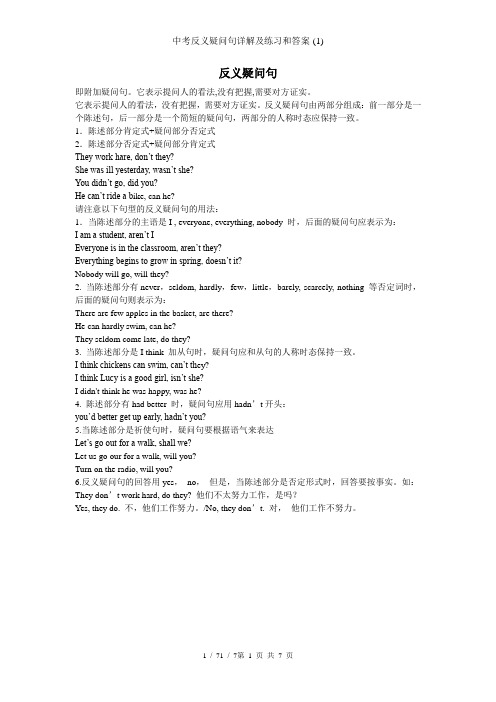中考反义疑问句 特殊句式-反义疑问句
反意疑问句

反意疑问句1.反意疑问句篇1归纳:1)由两部分组成:前一部分陈述,后一部分提问。
2)如果前一部分用肯定形式,后一部分就用否定形式;如果前一部分用否定,后,部分就用肯定形式。
即:前肯后否,前否后肯。
3)如果前句的谓语是行为动词,则反意疑问部分需借助助词do, don’tdose doesn’t或did(didn’t),需使用哪一个,视乎时态、人称而定。
一些特殊的反意疑问句:1.陈述部分的主语是i'm...句型时,疑问部分要用 aren't i。
如:i'm an english teacher, aren't i? 我是一名英语老师,不是吗?2.陈述部分是感叹句时,疑问部分用be +主语。
如:what beautiful hats, aren't they? 多么漂亮的帽子,不是吗?3.陈述部分是省去主语的祈使句时,疑问部分用will you。
如:don't be late next time, will you? 下次不要迟到了,好吗?come here, will you / won't you? 到这儿来,好吗?注意: let's 开头的祈使句,疑问部分用shall we, let us 开头的祈使句,疑问部分用will you。
如: let's start with the song, shall we? 咱们以这首歌开始,好吗?let us help you, will you? 让我帮助你,好吗?4.陈述部分的谓语是wish,疑问部分要用may +主语。
如:i wish to go to beijing, may i? 我希望去北京,好吗?5.陈述部分用 no, nothing, nobody, never, few, seldom, hardly, rarely, little等否定含义的词时,疑问部分用肯定含义。
初中反义疑问句详解及练习和答案

反义疑问句即附加疑问句。
它表示提问人的看法,没有把握,需要对方证实。
它表示提问人的看法,没有把握,需要对方证实。
反义疑问句由两部分组成:前一部分是一个陈述句,后一部分是一个简短的疑问句,两部分的人称时态应保持一致。
1.陈述部分肯定式+疑问部分否定式2.陈述部分否定式+疑问部分肯定式They work hare, don’t they?She was ill yesterday, wasn’t she?You didn’t go, did you?He can’t ride a b ike, can he?请注意以下句型的反义疑问句的用法:1.当陈述部分的主语是I,而句子又用来征询对方的意见时,附加疑问句中的主语用you。
如:I find English very interesting, don’t you?I don’t like that film, do you?2.当陈述部分的主语是everybody, everyone, someone, nobody, no one, somebody等合成代词时,附加疑问句中的主语通常用they。
但亦可用he,尤其是nobody, no one等作主语,具有否定概念时。
如:Somebody phoned while I was out, didn’t they?Nobody wants to go there, does he?3.当陈述部分的主语是不定代词everything, nothing, anything, something时,附加疑问句中的主语一般用it,不用they。
如:Everything seems all right now, doesn’t it?Nothing is kept in good order, is it?Something must be done to stop pollution, isn’t it?4.当陈述部分的主语是指示代词this, that或these, those时,附加疑问句中的主语分别用it 和they。
【中考英语】反意疑问句的9大常考特殊用法.doc

疑问句通常包含一般疑问句、选择疑问句、特殊疑问句、反意疑问句四种形式。
其中,反意疑问句的时态与人称比较复杂,在中考中也容易设置陷阱,今天我们就来总结一下反意疑问句。
1.句子结构陈述句+附加疑问部分其中,附加疑问部分:be动词/助动词/情态动词+陈述句主语对应的代词2.语法原则“前肯后否,前否后肯”(人称和吋态前后保持一致)如:You are from Australia, arerft you? 肯定否定Jack doesn^t live in Guilin, does he?否定肯定3・九大常考特殊用法(1 )当陈述句中岀现no, nobody, never, none, neither等表否定含义的词时,附加疑问部分用肯定形式。
如:♦There is no rice in the bowl, is there?(2 )当陈述句中出现few, little, hardly, seldom等表示否定意义的词时,附加疑问部分用肯定形式。
如:♦There is little rice in the bowl, is there?(3 )当陈述句是There be句型的时候,附加疑问句仍然用“there”。
如:♦There is a cat in the tree, isn't there ?(4 )当陈述句为“IF”句型时,附加疑问部分用“areit I”。
如:♦I am your teacher now, aren't I ?(5 )肯定祈使句的附加疑问咅盼用“will you”或《onSyoiT ;否定祈使句的附加疑问部分只用“will you”。
如:♦Open the window, will you/won't you?♦Don't go out, will you?(6 )以Lets开头的祈使句,其附加疑问咅盼用“shall we,?;以Let us/sb•开头的祈使句,其附加疑问咅B分用“will yoiT。
最新中考初中英语反义疑问句及问答

中考初中英语反义疑问句及问答组成部分:前一部分是一个陈述句,后一部分是一个简短的疑问句,两部分的人称时态应保持一致。
主要形式:陈述部分肯定式+疑问部分否定式;陈述部分否定式+疑问部分肯定式。
反义疑问句有时带有感情色彩,表示惊奇,愤怒,讽刺,不服气,疑惑,嫉妒等。
eg: Let’s go to the supermarket, shall we?They work hard, don’t they?不定代词当陈述部分的主语是(1)one时,后面的疑问句可用one/he.(2)no one时,后面附加疑问句中主语用they。
(3)everything, anything, nothing, something等表示物的不定代词时,附加疑问句中主语用itSomething is wrong with your watch, isn’t it?(4)this, that,或those, these时,附加疑问句中主语用it或they.(5)everyone,everybody,someone,somebody,anyone,nobody等时,附加疑问句中主语一般用they(口头语,非正式文体)/he(正式文体)。
Everyone in your family is a teacher, aren’t they\isn't he?(6)不定式时,动名词,其他短语,附加疑问句中主语一般用it。
(7)there be句型时,附加疑问句中一般用be/情态动词/助动词+there。
否定意义的词(1)当陈述部分有never,seldom, hardly,few,little,barely, scarcely, nothing,none, rarely ,no, not, no one, nobody, neither等否定意义的词汇时,后面的反意疑问句则为肯定形式:There're few apples in the basket, are there?He can hardly swim, can he?They seldom come late, do they?(2)当陈述部分含有否定意思的词是unhappy, dislike, unfriendly,等含有否定词缀的派生词,也就是有un, dis-前缀、-less后缀等含词缀而意思否定的词,当肯定句处理,疑问部分用否定形式。
中考反义疑问句详解及练习和答案-(1)

反义疑问句即附加疑问句。
它表示提问人的看法,没有把握,需要对方证实。
它表示提问人的看法,没有把握,需要对方证实。
反义疑问句由两部分组成:前一部分是一个陈述句,后一部分是一个简短的疑问句,两部分的人称时态应保持一致。
1.陈述部分肯定式+疑问部分否定式2.陈述部分否定式+疑问部分肯定式They work hare, don’t they?She was ill yesterday, wasn’t she?You didn’t go, did you?He can’t ride a b ike, can he?请注意以下句型的反义疑问句的用法:1.当陈述部分的主语是I , everyone, everything, nobody 时,后面的疑问句应表示为:I am a student, aren’t IEveryone is in the classroom, aren’t they?Everything begins to grow in spring, doesn’t it?Nobody will go, will they?2. 当陈述部分有never,seldom, hardly,few,little,barely, scarcely, nothing 等否定词时,后面的疑问句则表示为:There are few apples in the basket, are there?He can hardly swim, can he?They seldom come late, do they?3. 当陈述部分是I think 加从句时,疑问句应和从句的人称时态保持一致。
I think chickens can swim, can’t th ey?I think Lucy is a good girl, isn’t she?I didn't think he was happy, was he?4. 陈述部分有had better 时,疑问句应用hadn’t开头:you’d better get up early, hadn’t you?5.当陈述部分是祈使句时,疑问句要根据语气来表达Let’s go out for a walk, shall we?Let us go our for a walk, will you?Turn on the radio, will you?6.反义疑问句的回答用yes,no,但是,当陈述部分是否定形式时,回答要按事实。
初中反义疑问句详解及练习和答案

初中反义疑问句详解及练习和答案反义疑问句即附加疑问句。
它表示提问人的看法,没有把握,需要对方证实。
它表示提问人的看法,没有把握,需要对方证实。
反义疑问句由两部分组成:前一部分是一个陈述句,后一部分是一个简短的疑问句,两部分的人称时态应保持一致。
1.陈述部分肯定式+疑问部分否定式2.陈述部分否定式+疑问部分肯定式They work hare, don’t they?She was ill yesterday, wasn’t she?You didn’t go, did you?ike, can he?He can’t ride a b请注意以下句型的反义疑问句的用法:1.当陈述部分的主语是I,而句子又用来征询对方的意见时,附加疑问句中的主语用you。
如:I find English very interesting, don’t you?I don’t like that film, do you?2.当陈述部分的主语是everybody, everyone, someone, nobody, no one, somebody等合成代词时,附加疑问句中的主语通常用they。
但亦可用he,尤其是nobody, no one等作主语,具有否定概念时。
如:Somebody phoned while I was out, didn’t they?Nobody wants to go there, does he?3.当陈述部分的主语是不定代词everything, nothing, anything, something时,附加疑问句中的主语一般用it,不用they。
如:Everything seems all right now, doesn’t it?Nothing is kept in good order, is it?Something must be done to stop pollution, isn’t it?4.当陈述部分的主语是指示代词this, that或these, those时,附加疑问句中的主语分别用it 和they。
中考英语-反义疑问句PPT(共46张PPT)
A.目的:我们使用反义疑问句来确认某件事是否是真实的, 或者期望得到对方的肯定回答。
B.构成:陈述部分+附加疑问部分
C.规则: 1.附加疑问部分构成: 由谓语动词的正确形式(be,do ,情态动词)+主格代词 (he,they,it等) 2.时态 陈述部分与附加疑问部分时态保持一致
3) 关于陈述部分的主语和疑问 部分的主语一致问题
陈述部分主语
不定代词everyone,no one, nobody everything,anything,nothing,som ething, this,that one
疑问部 分主语
he/they
it one/he
例句
Everyone is in the classroom, aren't they? Everything goes well, does it? This is your book, isn't it? One can't be always young,can one?
now,_________? 4.It's a nice day,______? 5.Arthur is responsible for the newspaper, ____? 6.Alice has never seen a three-D movie at the cinema,
_______?
动词 + there
There are some apples in the basket, aren't there? There isn't any milk left, is there?
反义疑问句讲义
特殊句式———反义疑问句反义疑问句:是附加在陈述句之后,对陈述的内容提出质疑,或通过反问来强化陈述内容的一种疑问句。
反义疑问句的构成:陈述部分+附加部分。
陈述部分为肯定句,附加部分一般为否定句,陈述部分为否定句,附加部分一般用肯定形式,附加部分的主语,必须用人称代词。
陈述部分用降调,附加部分一般用声调。
附加部分的构成:be动词/助动词/情态动词的肯定或否定形式+主语Lucy doesn’t like chocolate, does she?The little boy can’t read, can he?Mary reads a story for her daughter every night, does she?He is a worker, isn’t he ?You aren’t a teacher, are you?They went to the zoo yesterday, didn’t they?You haven’t finished your homework , have you?He will help us, won’t he ?反义疑问句的回答:答语用yes, no 回答,特别注意陈述部分为否定句的回答,此时,yes,意为“不”no意为“是”。
He is a student, isn’t he ? Yes, he is. 是的,他是。
No, he isn’t. 不,他不是。
They don’t work hard, do they? Yes, they do. 不,他们努力工作No, they don’t。
是的,他们没有努力工作。
1.主谓语是I am…..., 附加部分用:______________ I wish……附加部分用:_______________I am as old as your brother,___________?I wish I did it,_______?2主语是one ,附加部分主语用_______.One should be ready to help others,_________?3.主语是something, anything ,everything, nothing, this, that 时,附加部分主语用___________________.Something is wrong with my bike,__________?This isn’t a good plan,___________?That’s your sister,__________?4.主语是somebody, someone, anybody, anyone, everybody, everyone, nobody, no one, none , neither, these, those 时,附加部分主语用__________.Everyone is here,_________?Neither team can win,________?Those are beautiful flowers,___________?5.主语是不定式,动名词,主语从句时,附加部分主语用________To do one good thing is easy for a person,________?Skating is your favorite sport,__________?Where we will build the gym hasn’t been decided yet,__________?6.陈述部分含有否定及半否定意义的词,附加部分用肯定形式_____________________________________________________________> Tom made no answer,_________?She has few friends,__________?7.陈述部分含有加前缀un-dis-.im-, -less或后缀构成否定意义的词,附加部分仍用否定形式。
中考英语专题复习 反义疑问句知识讲解
反义疑问句反义疑问句(The Disjunctive Question 或 Question tags) 即附加疑问句。
它表示提问人的看法,没有把握,需要对方证实。
反义疑问句由两部分组成:前一部分是一个陈述句,后一部分是一个简短的疑问句,两部分的人称时态应保持一致。
主要形式:陈述部分肯定式+疑问部分否定式;陈述部分否定式+疑问部分肯定式。
陈述部分和疑问部分要么前肯后否,要么前否后肯。
这类反义疑问句有时带有感情色彩,表示惊奇,愤怒,讽刺,不服气等。
例如:You call this a day's work,don't you?你说这就叫一天的活儿,不是吗?目录1什么是反义疑问句2反义疑问句的答案3句子结构4速记方法5主语一般词语6重点归纳7其他信息什么是反义疑问句1.英语中,反义疑问句是由陈述句和附在其后的附加疑问句组成。
其中附加疑问句是对陈述句所说的事实或观点提出疑问,起证实作用,一般用于证实说话者所说的事实或观点。
翻译为“是吗"句子结构1.陈述部分肯定句+疑问部分否定句(可记为前肯后否).例:They work hard, don’t they?Let's go to the supermarket ,shall we?2.陈述部分否定句+疑问部分肯定句(可记为前否后肯).例:You didn't go, did you?句子类型一种是反义的附加疑问句;一种是非反义的附加疑问句。
简单来说,就是“前肯后否”或“前否后肯”。
反义疑问句的答案1.前肯后否:回答时,如果情况属实,用Yes加上反问句的倒装肯定句;如果情况不属实,则用No加上反问句的倒装否定句。
例如You were moved by your stud ents, weren’t反义疑问句you?情况属实:Yes, I was. 情况不属实:No, I wasn't2.前否后肯::回答时,如果情况属实,用No加上反问句的倒装否定句。
中考反义疑问句练习
中考反义疑问句考点讲解及专项训练反意疑问句两个局部:肯定句+否认?和否认句+肯定?反问的局部寻找BE动词(am,is are ,was ,.were )助动词(do ,does ,did ,will ,have ,has ,would )或者情态动词(can ,could ,must ,may ,might ,should )有否认词的句子是否认句:never ,hardly ,hardly ever ,seldom ,no ,nothing ,few, little一、反意疑问句中问句局部的动词与陈述局部的动词在语气上成相反的对应关系,即:肯定+否认?否认+肯定?如:①You can’t do it, can you? ②They are very late for the meeting, aren’t they?二、反意疑问句中问句局部的动词与陈述局部的动词种类要对应一致。
如:①He has supper at home every day, doesn’t he? (不能用hasn’t he?)②They have known the matter, haven’t they? (不能用don’t they?)三、反意疑问句中问句局部的动词在时态上应和陈述局部的时态一致。
如:①They will go to town soon, won’t they?(不能用don’t they?或aren’t they?)②He works very hard, doesn’t he?(不能用didn’t he?或won’t he?)四、反意疑问句的陈述局部含有由un-, im-, in-, dis-, 等否认意义的前缀构成的词语时,陈述局部要视为肯定含义,问句局部用否认形式。
如:①Your father is unhappy, isn’t he?(不能用is he?)②The man is dishonest, isn’t he? (不能用is he?)③It is impossible to learn English without remembering more words, isn’t it?(不能用is it ?)五、反意疑问句的陈述局部带有little, few, never, hardly, seldom等否认意义的词时,问句局部用肯定式。
- 1、下载文档前请自行甄别文档内容的完整性,平台不提供额外的编辑、内容补充、找答案等附加服务。
- 2、"仅部分预览"的文档,不可在线预览部分如存在完整性等问题,可反馈申请退款(可完整预览的文档不适用该条件!)。
- 3、如文档侵犯您的权益,请联系客服反馈,我们会尽快为您处理(人工客服工作时间:9:00-18:30)。
中考反义疑问句特殊句式-反义疑问句专题复习-反义疑问句反义疑问句结构:前否后肯,或前肯后否1.当陈述句部分的主语是不定代词no one,none,nobody,everyone,someone,everybody,somebody 等时,其附加疑问句的主语强调全部时可用they,强调个体时用he.No one phoned me while I was out,did they?Everyone is having a good time, aren`t they?Someone is waiting for you,isn`t he?2.陈述句的主语是复合不定代词everything,anything,something,nothing,附加疑问句部分主语用it.Everything goes well with you,doesn`t it?Nothing has been considered about this meeting,has it?3.不定代词one作主语,附加疑问句的主语在正式场合用one,非正式场合用you.One can`t be too careful,can one/you?4.当陈述句的主语是指示代词,附加疑问句主语要用相应的人称代词,即this/that用it,these/those用they.That was a hundred years ago,wasn`t it?Those are yours,aren`t they?5.陈述句部分为there be句型时,其后附加疑问句部分仍用there.There will be a special meeting tomorrow,won`t there?There used to be a lake here,usedn`t/didn`t there?6.情态动词must在反义疑问句中的用法,应由陈述部分的意义来决定。
必须,禁止You must send for a doctor immediately,mustn`t you?You mustn`t walk on the grass,must you?有必要We must have a discussion this evening,need`t we?一定,想必对现在情况推测:You must be very tired, aren`t you?对过去情况推测:It must have rained last night,didn`t it?对已完成情况的推测:He must have studied English for many years,hasn`t he?7.当陈述部分有情态动词used to时,附加疑问句部分的谓语动词可用used to也可用did.She used to study in Russia,usedn`t/didn`t she?8.当陈述句中含有had better时,附加疑问句用hadn`t或shouldn`t.You`d better remain calm when in danger,hadn`t/shouldn`t you?9.当陈述句中含有have to时,附加疑问句部分的助动词用do或者陈述句中助动词的相应形式.We have to get up at four tomorrow,don`t we?You will have to wait for him,won`t you?10.当陈述句部分主句带有no,never,nothing,nowhere,rarely,hardly,seldom,few,little等否定或半否定词时,附加疑问句一般用肯定式;若陈述部分带了否定词缀的派生词,如:helpless,hopeless,dislike,useless,unable,unfair等时,附加疑问句则用否定形式.You have never read Gorky`s works,have you?Jane is disappointed,isn`t she?You dislike playing the piano,don`t you?11.肯定祈使句后面的附加疑问句一般用will you或won`t you.Leave all the things as they are,will you/won`t you?Give me a hand,will you/won`t you?12.以let`s开头的祈使句,附加疑问句部分要用shall we;而以let me/us 开头的祈使句,附加疑问句部分用will you.Let`s try another way,shall we?Let us have a try,will you?13..当陈述部分是否定的祈使句时,附加疑问句部分除了用will you外,也可用can you,此时附加疑问句部分必须是肯定式。
Don`t make much noise,will you/can you?14.当陈述部分是并列句,附加疑问句与邻近分句一致.Bob speaks English,but his wife speaks German,doesn`t she?15..当陈述句部分是一个主从复合句,附加疑问句与主句一致。
当陈述部分是I`m sure,I`m afraid,I don`t think(imagine,expect,suppose等)时,附加疑问句与从句一致,否定转移。
He said that Mary was late for the lecture,didn`t he?I don`t think she can finish it on her own,can she?真题再现1.Nancy,sweep the classroom,__________?A.don`t youB.do youC.will youD.doesn`t she2.We have to finish the work now,_________?A.don`t weB.haven`t weC.have weD.do we3.The news reported that the rainstorm was in the area last night.Yes._______bad weather it was!A.What aB.How aC.whatD.How4.-_______do you go to the cinema?-Once a month.A.How longB.How farC.How oftenD.How much5.-____________?-He is not very heavy and wear glasses.A.What does Ron look likeB.What is RonC.What do you think of RonD.How is Ron6.________clever the boy is!A.HowB.WhatC.What a7. Do you want to be healthy? ________.Smiling can help you say healthy.A.SmileB.SmilingC.To smileD.Smiled8.-_________is it from the village to your farm?-About 10 minutes` walk.A.How oftenB.How soonC.How longD.How far9._________great picture! Who painted it?A.HowB.WhatC.How aD.What a10.-He didn`t go to the corner yesterday,did he?-_________.He was busy studying for the tests all day.A.No,he didn`tB.Yes,he didC.No,he didD.Yes,he didn`t11.___________something wrong with my bike. Can I use yours?A.It isB. It wasC.There isD.There was12.-You haven`t been to the West Lake,have you?-____________. But I will go there with my parents this summer vacation.A.No,I haven`tB.No,I didn`tC.Yes,I haveD.Yes,I did13. Don`t copy other`s homework anymore!_____________,Miss Smith.A.OK,I willB.Sorry,I won`tC.OK,I don`t14.________keep water running when you are brushing your teeth or washing your hands,Jack.OK. I know we must save every drop of water.A.Why notB.pleaseC.Don`t15.-You like listening to Sally`s songs,don`t you?-___________.She has a sweat voice.A.Yes,I doB.Yes,she doesC.No,I don`tD.No, she doesn`t强化训练1.He is not honest. ________believe him.A.NotB.Don`tC.To notD.Not to2.If you want to say,let me know,______?A.will youB.Shall weC.do youD.do we3.Never come again,________?A.will youB.won`t youC.do youD.does he4.Nothing is difficult if you out your heart into it,_______?A.aren`t theyB.isn`t itC.is it D,are they5.________loving weather we are having these days!A.HowB.How anC.What What an6.____________information he offered us! We all thank him.A .What useful B.What useless C.How useful D.How useless7.-You haven`t ever been to Shanghai,have you?-________. This is the first time.A.Yes,I haveB.Yes,I haven`tC.No,I haveD.No,I haven`t8.-________is your maths teacher?-The one in red.A.WhatB.WhereC.WhichD.How9.-The boy has to stay at home to look after his little sister,______?-Yes,because his mother has gone shopping.A.does heB.is heC.doesn`t heD.hasn`t he10._______cold it is today!A.WhatB.HowC.What aD.How a答案:真题答案CACCAAADDACABCA强化答案BAACCADCCB二、英语书面表达专项训练2.书面表达即将步入高中的你们马上要面对近几年热门讨论的“3+X”高考模式的选择(3即语文,数学,英语。
